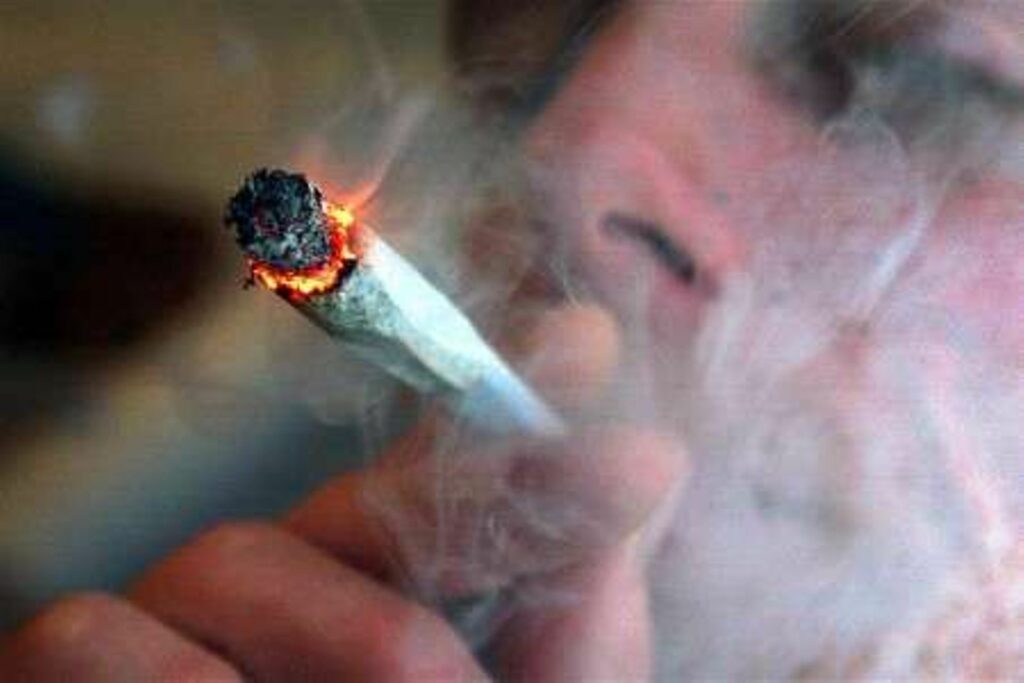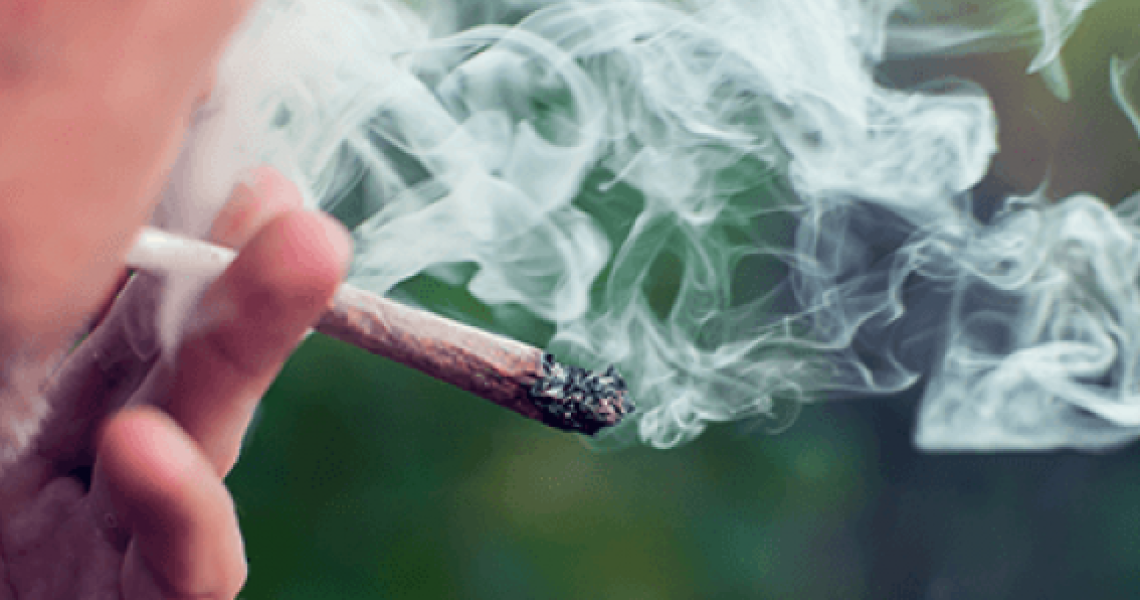Understanding the challenges of cannabis withdrawal
Quitting smoking cannabis is a courageous decision that can significantly transform daily life. Yet for many people, withdrawal represents a real challenge, due to the effects of THC on the brain and the double dependency often associated with smoking.
In France, almost a million people are considered regular users, and over 200,000 people seek help for cannabis-related problems every year. This figure shows just how deeply rooted this addiction can be, and how difficult it is to break away from it.
Far from being a simple bad habit, prolonged cannabis use affects both mental and physical health. It can lead to mood disorders, reduced motivation and cognitive difficulties. Many smokers are also unaware of the consequences ofcombining cannabis and tobacco, which aggravates dependency and multiplies health risks.
Laser auriculotherapy is one of the most effective and natural methods of successful withdrawal. Already used forsmoking cessation, it can also help reduce the urge to use cannabis, by stimulating certain reflex points in the ear that influence the nervous system and stress management.
This article explains in detail why quitting cannabis is an essential step towards a better quality of life, and how laser auriculotherapy can be a real ally in this process.

Why stop smoking cannabis?
Cannabis and its effects on mental and physical health
Smoking cannabis has far-reaching consequences for the body. Contrary to certain beliefs, it is not a harmless drug. Its main active ingredient, THC, alters brain chemistry by altering neuronal connections and reducing the production of dopamine (the pleasure hormone).
Many young smokers report reduced motivation, memory problems and loss of interest in daily activities. Some explain that, although they began using for pleasure, they now feel a form of psychological dependence, preventing them from functioning normally without cannabis.

📌 Testimony of Thomas, 28:
“At first, I used cannabis to relax after work. But as the months went by, I realized that I needed it every day. I was constantly tired, demotivated and even started having anxiety attacks when I tried to cut down on my consumption.”
In addition to the psychological effects, cannabis smoke, often mixed with tobacco, affects the lungs and increases the risk of respiratory illnesses.
📌 Testimonial from Sophie, 35:
“I gave up cannabis and tobacco a year ago, and I’ve noticed a radical change. I breathe better, sleep better and feel more serene on a daily basis.”
Is cannabis addiction comparable to tobacco addiction?
Cannabis addiction is often underestimated, especially when combined with tobacco. Many smokers are unaware that the nicotine in tobacco reinforces theaddictive effect of cannabis.
Double dependency works like this:
- THC is psychologically addictive, leading to compulsive craving.
- Nicotine, on the other hand, generates a physical dependency, making quitting even more difficult.
- The combination of the two intensifies the need to smoke, making withdrawal more complex and relapse more frequent.
- H2: CBD: An alternative to cannabis for gradual, effective withdrawal?
In recent years, CBD (cannabidiol) has established itself as a legal, psychotropic-free alternative to traditional cannabis. Unlike THC (tetrahydrocannabinol), the main active component of cannabis responsible for its euphoric and addictive effects, CBD does not alter the state of consciousness and does not cause a “high”.
For people going through withdrawal, CBD can be an invaluable aid in managing craving and stress, particularly in the early stages of cessation. Indeed, many former users testify to the benefits of CBD in the process of gradually reducing their cannabis consumption.
📌 Testimonial from Julien, 29:
“I smoked cannabis for over ten years and always had trouble managing my stress without it. Switching to CBD allowed me to keep my ritual without the side effects of THC. I was able to quit more easily by gradually tapering off.”

What are the benefits of CBD in cannabis withdrawal?
✔ Reducing stress and anxiety: stopping cannabis use can cause high irritability and increased stress, due to the absence of THC. CBD has natural anxiolytic properties, helping to stabilize mood and better manage stressful situations.
✔ Improved sleep: Many cannabis users use this substance to find sleep. When stopping, insomnia or nocturnal awakenings may appear. CBD helps people fall asleep and improves sleep quality, avoiding the disturbances associated with THC withdrawal.
✔ Alleviating the physical symptoms of withdrawal: During withdrawal, symptoms such as muscle tension, headaches and nervousness can occur. CBD has relaxing and anti-inflammatory properties that help you get through this period better.
✔ A smooth transition: Going straight from regular cannabis use to complete cessation can be difficult, especially for long-time smokers. Using CBD as a substitute can be a first step to gradually reducing THC consumption without experiencing abrupt withdrawal.
CBD, the ideal solution for everyone?
Although CBD can help ease withdrawal, it should not be seen as a quick fix. It’s essential to understand that it’s not a product designed to sustain addiction, but rather a transitional tool that needs to be used intelligently.
📌 Testimonial from Sophie, 34:
“I tried CBD when I stopped using cannabis, and it really helped me get through the first few weeks. But at some point I realized that I also needed to work on my habits and stress management in other ways, with sport and meditation.”
To maximize its effects and achieve lasting withdrawal, we recommend combining its use with other methods such as :
- L’laser auriculotherapyhelps reduce cravings and rebalance the nervous system.
- Sport, which stimulates the production of dopamine and endorphins, helping to restore a natural sense of well-being.
- Psychological support, to work on the emotional and behavioral factors thatled to consumption.
You may also be interested in this article: Discover the MyLaserTabac method and become a laser ear reflexology practitioner
Laser auriculotherapy, a natural and effective method to support withdrawal
How does laser auriculotherapy work?
Laser auriculotherapy, also known as anti-smoking laser, is based on the stimulation of specific points on the ear, which are directly linked to the areas of the brain involved in addiction, stress and emotional management.
During a session, the practitioner uses a soft laser to send signals to the brain, helping to reduce cravings and withdrawal symptoms.
📌 What are the effects of this method?
- Reduced cravings from the very first session.
- Reduced stress and anxiety, often responsible for relapse.
- Improved sleep, an essential element in the withdrawal process.
- Mood stabilization, limiting mood swings and irritability.

Can cannabis really be stopped with this method?
Many people who have tried laser auriculotherapy for cannabis cessation report a significant reduction in cravings from the very first sessions.
📌 Testimonial from Thomas, 40:
“I tried to quit several times, but the anxiety and withdrawal were too strong. After three sessions of laser auriculotherapy, I felt a clear improvement. Cravings are less frequent and I sleep much better.”
This method is not miraculous, but it is an effective accompaniment to the quitting process, complementing lifestyle changes and appropriate support.
How can you maximize your chances of successful withdrawal?
Adopt new habits to avoid relapse
Withdrawal is not just about stop smokingIt’s also about relearning how to live without cannabis.
- Replace consumption with activities such as sport, meditation or breathing exercises.
- Avoid risky situations, such as parties where you know you’ll be tempted to smoke.
- Learn to manage your emotions in a different way, by consulting a specialist or joining a discussion group.
📌 Testimonial from Léo, 32:
“The hardest thing was not to relapse when I saw my friends smoking. I decided to stop frequenting these situations and focus on my well-being. Auriculotherapy helped me manage my stress and cravings.”
Freeing yourself from cannabis for a better quality of life
Stopping smoking cannabis is a courageous decision that leads to physical and mental well-being, renewed motivation and a more balanced life. The process can be complex, but with the right methods and support, it becomes much more accessible.
Laser auriculotherapy, in conjunction with other natural tools such as CBD for a gradual transition, exercise and stress management, optimizes the chances of success. It’s not enough toeliminate consumption, but to transform habits in order to regain lasting stability and avoid relapse.
Each person evolves at his or her own pace, and it’s important to set progressive goals, surround yourself with the right resources and don ‘t hesitate to ask for support. Quitting cannabis is not a loss, but a new beginning, an opportunity to regain control over your life and realize your full potential.
📍 Ready to take the first step towards successful withdrawal? Find out howlaser auriculotherapy can help you quit for good and regain a better quality of life on MyLaserTabac.com 🚀💪
If you want to stop smoking cannabis, visit one of our centers throughout France and Europe.







